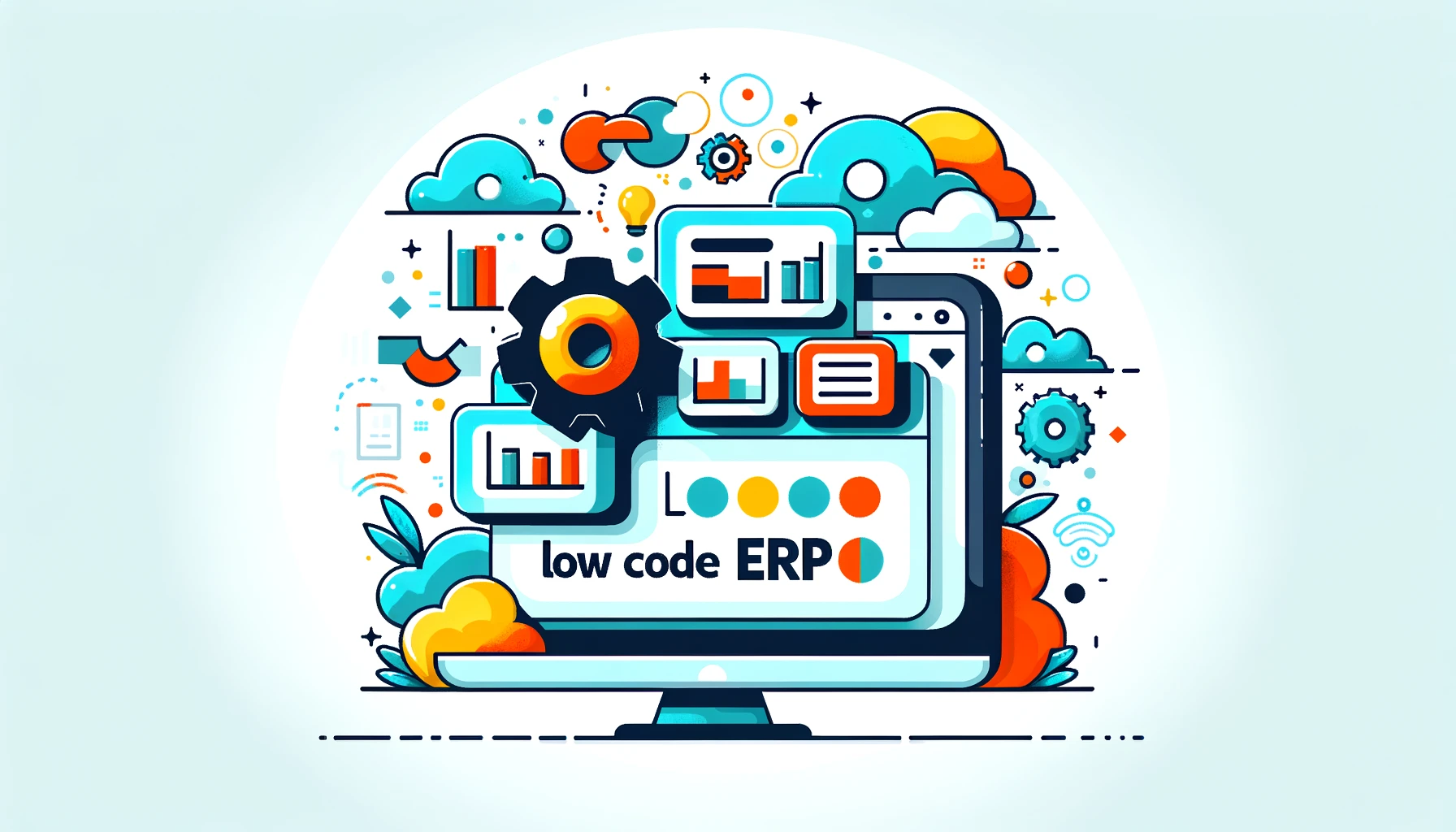Low Code ERP Solutions: Streamline Your Business

Discover how low code ERP solutions can revolutionize business efficiency and agility for a competitive edge.
Empowering Businesses with Low Code ERP
In today’s fast-paced market, businesses require agility and efficiency, and this is where a low code ERP becomes a game-changer. By simplifying the application development process, these systems empower companies to respond swiftly to market changes and internal demands. Here’s how they transform the business landscape:
- Quick Adaptation: With drag-and-drop interfaces, your company can quickly modify processes to meet new business requirements.
- Cost Reduction: By minimizing the need for specialized developers, you cut down on hefty development costs.
- User Empowerment: Non-technical staff can easily contribute to system enhancements, fostering a culture of continuous improvement.
Let’s dive into some of the tangible benefits:
- Increased Productivity: Teams spend less time on manual tasks, thanks to workflow automation.
- Better Collaboration: Real-time data sharing boosts cross-departmental cooperation.
- Enhanced Customer Service: Faster access to information leads to quicker customer resolutions.
Consider this comparison:
| Metric | Before Implementation | After Implementation | Improvement |
|---|---|---|---|
| Order Processing Time (hours) | 24 |
8 |
-66% |
| Order Error Rate (%) | 10 |
2 |
-80% |
| Customer Satisfaction Score | 7 |
9 |
+28.6% |
As you can see, implementing a low code ERP can significantly enhance your operational efficiency and customer satisfaction. 
In summary, adopting a low code ERP system positions your business for success by making it more adaptable, cost-efficient, and customer-centric. It’s not just a tool; it’s a strategic asset for any forward-thinking company.
The Revolution of Business Management with Low Code ERP
The advent of low code ERP systems is revolutionizing business management, offering unparalleled flexibility and control. These platforms are not just reshaping how companies operate; they’re redefining the very nature of innovation within the enterprise space. Here’s why:
- Speedy Deployment: Launch applications in record time, giving your business a competitive edge.
- Customization at Scale: Tailor solutions to your unique business needs without getting bogged down by traditional coding constraints.
Companies now have the ability to implement complex systems with ease, ensuring that their operations are running smoothly and efficiently. The integration of AI tools for business with low code platforms further enhances decision-making and automates routine tasks, freeing up valuable resources.
Consider the impact on customer management:
| Benefits of Low Code ERP | Impact on CRM |
|---|---|
| Enhanced Customer Experience | Improved satisfaction |
| Increased Efficiency | Streamlined sales processes |
| Improved Decision Making | Data-driven insights |
Embrace the low code revolution and position your business for a future where change is not just anticipated but seamlessly managed.

By leveraging a low code ERP, you’re not just keeping up with the times; you’re staying ahead of the curve.
Simplifying Complex Processes: The Low Code Approach
In the realm of enterprise management, complexity is often a given—but it doesn’t have to be a barrier. Low code ERP solutions are changing the narrative by simplifying even the most intricate business processes. This approach allows you to:
- Streamline Operations: Convert complex workflows into user-friendly interfaces.
- Facilitate Integration: Seamlessly connect with other systems to enhance functionality.
- Drive Innovation: Quickly prototype and iterate, leading to breakthrough solutions.
The key to this simplification is the platform’s intuitive design, which lets you visualize processes and make adjustments with ease. By doing so, you not only increase efficiency but also unlock new opportunities for growth and improvement.
Imagine a system where CRM and inventory management coexist within a single, streamlined framework, providing clear insights and effortless control. That’s the promise of low code ERP—a promise that’s increasingly within reach for businesses of all sizes.
Embrace the simplicity and watch your business thrive. 
By adopting a low code ERP, you’re investing in a platform that grows with you, ensuring that the complexities of today don’t hinder the opportunities of tomorrow.
Tailoring ERP to Your Business Needs Effortlessly
Gone are the days of one-size-fits-all solutions. A low code ERP system is like a tailor-made suit for your business—it fits just right. This innovative approach allows you to customize your ERP system effortlessly, ensuring it aligns perfectly with your business objectives and processes. Here’s what sets it apart:
- Flexibility: Modify and expand your ERP to evolve with your company’s growth.
- Accessibility: Enable your team to make changes without deep technical know-how.
This level of customization means that your ERP can adapt to new challenges and opportunities without missing a beat. You’ll be equipped to handle everything from CRM updates to supply chain management with a few clicks.
- Personalization: Craft an ERP experience that meets your specific industry demands.
- Innovation: Stay ahead with a system that encourages and supports new ideas.

Embracing a low code ERP is embracing the future of business technology—a future where your ERP system is as dynamic and unique as your business.
Navigating the Transition to a Low Code ERP System
Transitioning to a low code ERP system can seem daunting, but with the right approach, it’s a smooth and transformative process. Start by assessing your current operations and pinpointing areas ripe for improvement. This strategic evaluation will guide you in selecting a platform that best meets your needs.
Here are the steps to ensure a successful transition:
- Identify Your Needs: Understand the specific challenges and goals of your business.
- Choose the Right Partner: Select a platform known for ease of use and robust support.
- Train Your Team: Equip your staff with the knowledge to leverage the new system effectively.
- Implement Gradually: Roll out the system in phases to manage the changeover without disrupting business.
- Monitor and Tweak: Continuously evaluate the system’s performance and make adjustments as needed.
By following these steps, you’ll navigate the shift with confidence, setting your business up for increased efficiency and agility.

With a low code ERP, you’re not just upgrading your technology; you’re revolutionizing the way your business operates, paving the way for innovation and growth.
The Future is Here: Adapting to Low Code ERP Technology
The business world is constantly evolving, and staying ahead means embracing the future—low code ERP technology. This innovative approach equips you with a nimble, adaptable system that can pivot as rapidly as market trends do. As you consider adapting to a low code ERP, keep in mind these key advantages:
- Scalability: Your ERP grows with your business, effortlessly handling increased demand.
- User-Friendly: Intuitive design means quick onboarding for your team, reducing training time.
Taking the plunge into low code ERP means you’re not just keeping pace—you’re setting the pace, leading your business with a vision for tomorrow. It’s about making complex systems approachable, manageable, and most importantly, beneficial to your everyday operations.
- Competitive Advantage: Be the business that responds to change with confidence and speed.

Adapting to a low code ERP isn’t just an IT upgrade; it’s a strategic move that puts your business on the path to long-term success. Embrace this technology and watch your business soar to new heights.
FAQs
What is a low-code ERP system?
A low-code ERP (Enterprise Resource Planning) system is a software platform that allows organizations to manage their business processes with minimal coding required. It leverages visual development tools and pre-built modules that enable users to design, customize, and deploy applications quickly without needing extensive programming knowledge.
Who can benefit from using a low-code ERP solution?
Low-code ERP solutions are beneficial for businesses of all sizes that seek to streamline their operations and improve efficiency. They are particularly useful for companies with limited IT resources, as they enable non-technical staff to contribute to the development and customization of the ERP system.
How does a low-code ERP improve business efficiency?
A low-code ERP improves business efficiency by simplifying the process of developing and implementing business applications. By using visual interfaces and drag-and-drop components, businesses can quickly adapt their ERP to changing needs, automate workflows, and integrate with other systems, reducing the time and cost associated with traditional ERP implementations.
Can a low-code ERP be customized to fit specific business needs?
Yes, a low-code ERP is designed to be highly customizable. It provides a flexible framework that allows businesses to tailor applications to their specific processes and requirements. Users can add or modify features using visual tools and pre-built templates without writing complex code, making it easy to evolve the ERP system as the business grows.
What should a company consider when choosing a low-code ERP platform?
When choosing a low-code ERP platform, a company should consider the platform's ease of use, scalability, integration capabilities with existing systems, the range of available features, the level of customization possible, and the vendor's support and training resources. Additionally, it's important to evaluate the total cost of ownership, including licensing, implementation, and maintenance costs.
Read more about low-code platform ozma.io
ERP for Small Business UK: Streamlining Operations
ERP for Manufacturing: Optimizing Production Efficiency





